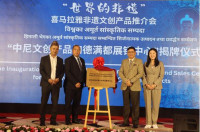Money
Demand for imported furniture on the rise
The evolving home and living concept along with the development of modern-style apartment and housing units has led to an increase in the demand for furniture of foreign brands and dealers have reported an annual business growth of 20 percent.
Prahlad Rijal
The evolving home and living concept along with the development of modern-style apartment and housing units has led to an increase in the demand for furniture of foreign brands and dealers have reported an annual business growth of 20 percent.
Around 60 percent of the furniture offered in Nepali market are imported, according to Kavindra Joshi, president of Nepal Furniture and Furnishing Association.
“Foreign brands offer a wide variety of choices at competitive prices and are promoted well than domestic products,” said Joshi.
“Moreover, domestic producers face obstacles like power cuts and high cost of raw materials which in turn increase the total cost of production.”
Ashish Syangtang, marketing executive at Furniture Land, said the customers are particularly attracted by quality and design of foreign brands like Ashley, Alder, BOFA and others.
“Currently, BOFA contributes the highest sales in the sofa segment and brands like In Home and ALDER lead the sales in beds and home decor segments,” he said.
Syangtan said such brands are high in demand because they deliver higher comfort and are easy to assemble and move around. “This year, we launched some beds from In Homes and the stock sold out in just three months,” he said.
Furniture Land deals with furniture from foreign brands like, Ashley, BOFA, Paradise, ALDER, In Home and JAS.
Bristol and Wellington sofas of BOFA are more preferred by offices and households. A five-seater Bristol sofa is priced at Rs115,000 and Wellington sofas cost around Rs285,000.
According to a research by Research and Markets, the global bedroom furniture market has been predicted to grow at a compound annual growth rate of 3.4 percent during the period 2016-2020.
“The global bedroom furniture industry is highly fragmented. It is also labour-intensive and includes craft-based local firms and mass volume producers and retailers. With the emergence of flat-pack and ready-to-assemble (RTA) furniture, mass production has become viable, allowing for larger quantities of shipments,” the reports states.
According to the report, the global furniture market is seeing a change in buying patterns in accordance with evolving home and living concepts.
Home style, lifestyle, fashion magazines and blogs are influencing more and more customers. The customers are investing increasingly in remodelling bedrooms in the latest interior design styles and that has made the product replacement cycle shorter.
Akhil Trading, distributor of Istikbal furniture of Turkey and other brands, has reported an annual growth of 25 percent. “The home furniture segment is growing fast as our offerings are of European standard and more durable,” said Akhil Chapagain, chairman of Akhil Trading.
“We first opened our store two years ago. In the first year, we saw satisfactory sales growth. In the second year, the earthquake and trade embargo led to a significant slump and in the upcoming fiscal year we expect the sales to grow by 25 percent.”
According to stakeholders, increasing conviction for foreign brands can be attributed to rapidly evolving lifestyle choices and high demand for ergonomic furniture from foreign manufacturers.




 9.12°C Kathmandu
9.12°C Kathmandu














